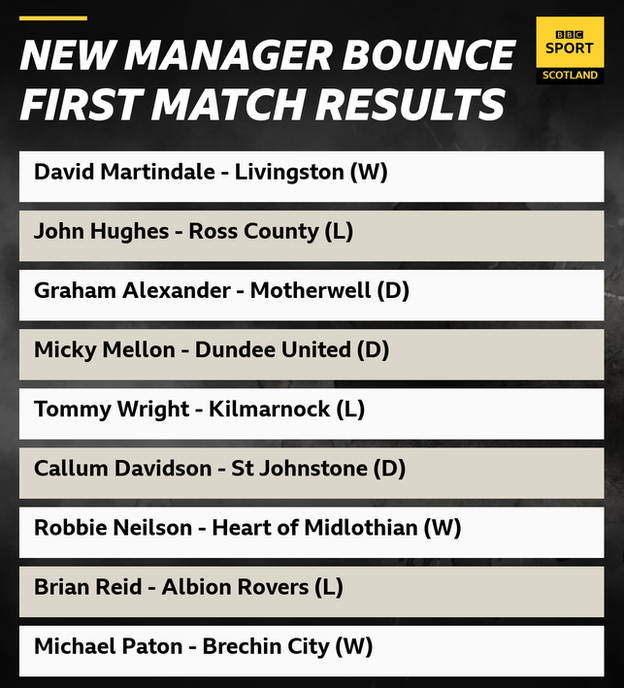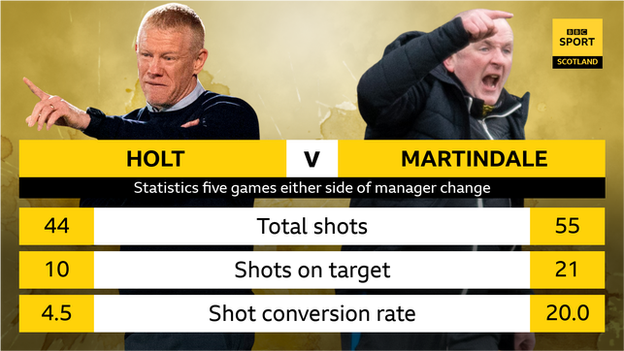Scottish football: Does the new manager bounce exist?
- Published
Footballers often profess that a new manager bounce can spring a team from desolation to delirium, but is there such a thing?
Last week, Tommy Wright became the latest manager to take charge of a Scottish club this season, only to lose his first two games in charge of Kilmarnock.
So, does the "bounce" exist? Or is it just a myth? BBC Scotland wades through the facts and statistics to find out.
A hat-trick of dugout debut wins
Across Scotland's 42 teams in the top four leagues, nine have had to get to grips with a new manager coming in either at the start of the campaign or during.
Previous managers at Kilmarnock, Motherwell, Livingston, St Johnstone, Dundee United, Ross County, Heart of Midlothian, Brechin City and Albion Rovers had various reasons for leaving; mainly mutual decisions with clubs or by resignation.
Of the nine newly appointed leaders, only three managed to win their first games.
David Martindale had the best debut, storming in with a 4-0 win for Livingston at home to Ayr United in the Scottish League Cup. Robbie Neilson led Hearts to a 1-0 victory at home against Inverness Caledonian Thistle, while Michael Paton revived hapless Brechin City with a 2-0 triumph against Albion Rovers.
Others weren't so lucky. The worst result came for poor Brian Reid when Rovers lost 5-2 at home to Ayr in the cup. A similar fate befell John Hughes on his managerial debut at Ross County, losing 2-0 to Celtic.

How do the new bosses compare?
Excluding clubs promoted or relegated, we looked at how the teams had done in the five games prior to a new takeover and in the five immediately afterwards.
Of the seven remaining teams, five managers had better results in their first five games than their predecessors had in their last five.
Motherwell garnered eight points in Graham Alexander's initial leadership, while Stephen Robinson's final few games only brought two draws. County improved immediately, gaining four more points under Hughes' direction after Stuart Kettlewell was unable to secure a single point in his final weeks with the Staggies.
Elsewhere, Brechin went on to lose their next four games under new management after their initial victory, but that still marked an improvement for Paton's team from the last five under Mark Wilson's tutelage, which gathered nil points. Similarly, improvement was made by Rovers.
Livingston enjoyed the biggest change - under Martindale collecting 15 points in the first five matches after Gary Holt's final days at the helm gathered 10 points in the form of three wins and a draw.
Motherwell have moved up a place to ninth and Livingston have surged from 10th to the giddy heights of fifth in the Scottish Premiership.
A new lease of life for Livingston
Martindale has overseen 11 wins and three draws since his appointment in November. Their streak was finally brought to a halt with a 2-1 home defeat by St Johnstone, followed by Saturday's 3-0 loss away to Dundee United.
However, a "new" manager bounce may not be the correct terminology given Martindale has been involved with the club for six years prior to his stewardship and is therefore familiar with the squad, but what has changed in their approach to games that was lacking under Holt's command?
For a start, their attempts on target have doubled - and their ability to convert them is fives times greater.

'It takes real time to show' - analysis
Mental skills coach and founder of Football Mindset, John Johnstone
A manager can come in and change the tactics, they can instil new belief and can ultimately build trust quite quickly. Players will up their effort when a new manager comes in. Like any job, they want to make a good impression, so they will tune in to the new voice.
If you give 100% to something that you believe is a lost cause, as opposed to giving that 100% to something you believe in, those percentages will look different. If their effort increases when a new manager comes in and you see results, I believe they were doing something wrong under the old manager.
There can be immediate results for a new manager, but typically it takes time for real results to show.